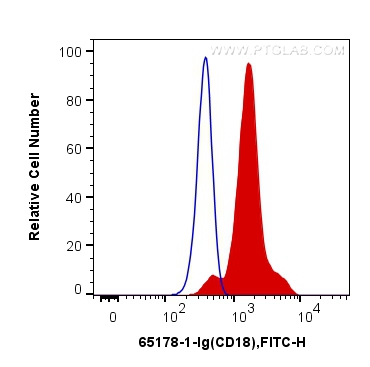验证数据展示
经过测试的应用
| Positive FC detected in | mouse thymocytes |
推荐稀释比
| 应用 | 推荐稀释比 |
|---|---|
| Flow Cytometry (FC) | FC : 1 ug per 10^6 cells in 100 μl suspension |
| This reagent has been tested for flow cytometric analysis. It is recommended that this reagent should be titrated in each testing system to obtain optimal results. | |
| Sample-dependent, Check data in validation data gallery. | |
产品信息
65178-1-Ig targets CD18 in FC applications and shows reactivity with Mouse samples.
| 经测试应用 | FC Application Description |
| 经测试反应性 | Mouse |
| 免疫原 |
Mouse CTL glycoprotein 种属同源性预测 |
| 宿主/亚型 | Rat / IgG2a, kappa |
| 抗体类别 | Monoclonal |
| 产品类型 | Antibody |
| 全称 | integrin beta 2 |
| 别名 | 2E6, AI528527, Cd18, integrin beta 2, Itgb2, LAD, LCAMB, Lfa1, MF17 |
| GenBank蛋白编号 | BC145644 |
| 基因名称 | CD18 |
| Gene ID (NCBI) | 16414 |
| RRID | AB_2918453 |
| 偶联类型 | Unconjugated |
| 形式 | Liquid |
| 纯化方式 | Purified by protein-A affinity chromatography |
| UNIPROT ID | P11835 |
| 储存缓冲液 | PBS with 0.09% sodium azide, pH 7.3. |
| 储存条件 | Store at 2-8°C. Stable for one year after shipment. |
背景介绍
CD18, also known as integrin beta-2, is a transmembrane protein that forms heterodimers with CD11a, CD11b, CD11c, CD11d (PMID: 1968349). CD11a/CD18 (LFA-1) is expressed by all leukocytes, while CD11b/CD18 (Mac-1) and CD11c/CD18 (p150,95) are normally restricted to expression on monocytes, macrophages, polymorphonuclear lymphocytes (PMNs), and natural killer cells (PMID: 1968349; 3109455; 10946284). CD18 plays an important role in mediating cell adhesion during immune response and defects of CD18 cause leukocyte adhesion deficiency (PMID: 3594570).
实验方案
| Product Specific Protocols | |
|---|---|
| FC protocol for CD18 antibody 65178-1-Ig | Download protocol |
| Standard Protocols | |
|---|---|
| Click here to view our Standard Protocols |


